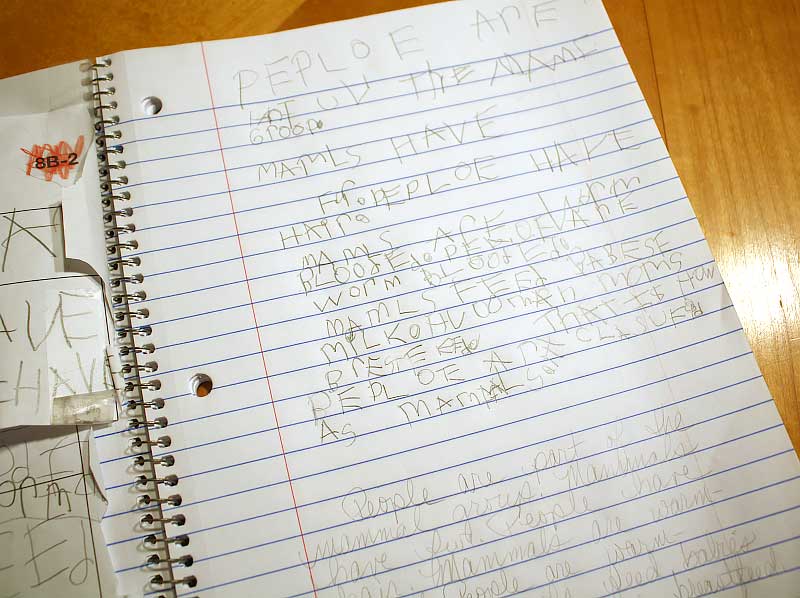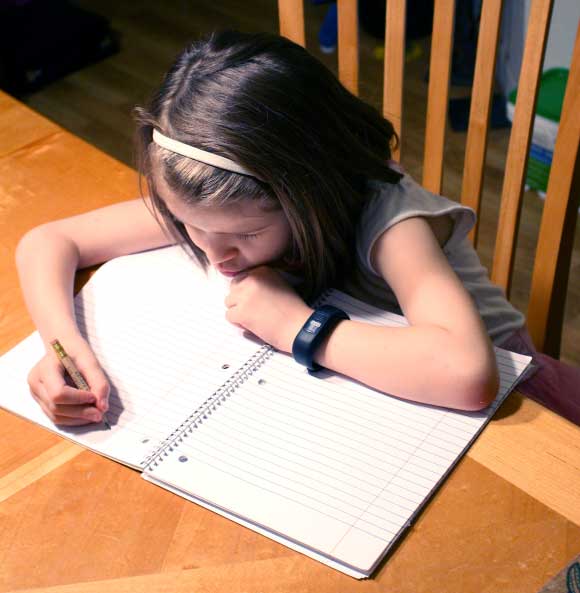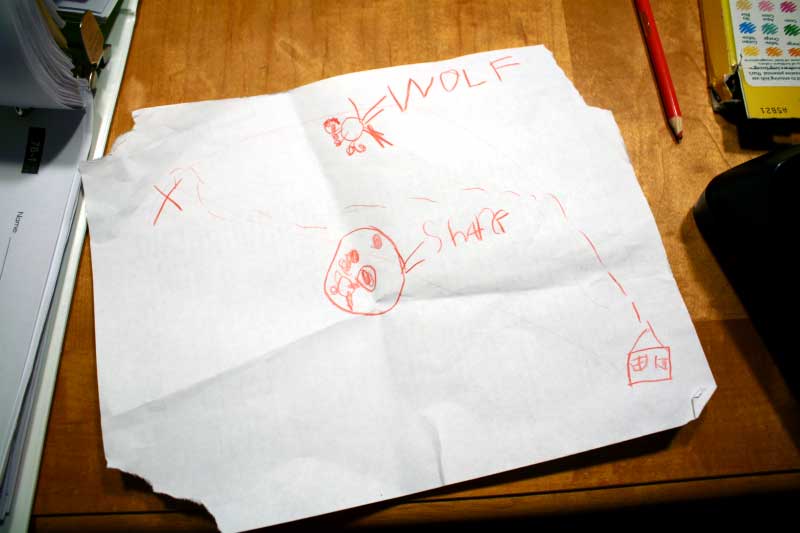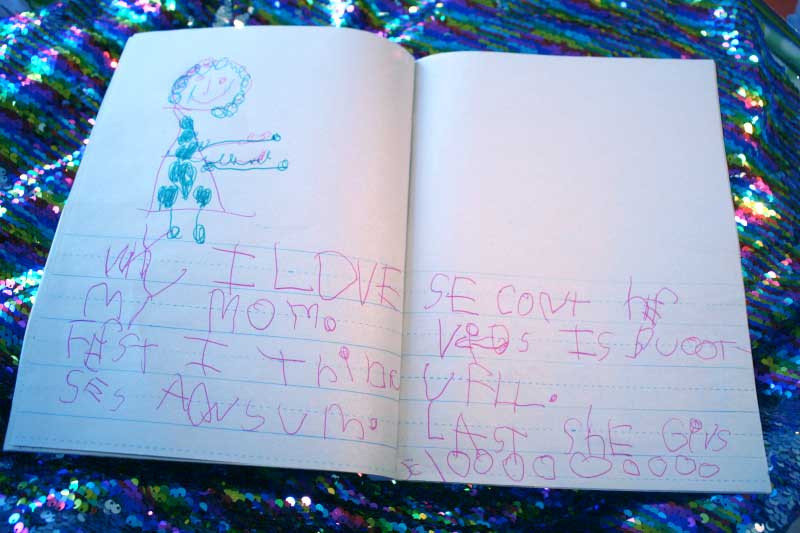
Because of my years spent in the classroom, I get lots of questions from new homeschooling parents asking about expectations. Usually these questions are tinged with an edge of panic, as these (usually) moms want to teach all the things, but they quickly realize that “all” can be quite overwhelming.
I’m reminded of the advice given out by a beloved veteran principal to teachers on the first day of a new school year: “Get ‘em in, get ‘em fed, get ‘em home safe; everything else is gravy.”

This advice calmed many a teacher’s nerves and that’s what I hope usually happens when I encourage the new-homeschooling parent to stress less about what’s being covered each day and focus more on just being.
Are there books in your day? Are you engaging with each other? Are you living life?
Great. Everything else is gravy.
However, there is one often-overlooked area that I always stress spending time on.
Writing.
You see, kids in the classroom get writing up the wazoo from the second they sit their little 5-year-old tushies in that itty-bitty chair for the very first time until, well, school ends a couple of decades later.
When you’ve got 23 kids packed onto a 26-letter rectangle of carpet and they all want to “share” what they think will happen next in a story, you quickly learn that the only way to accommodate their many answers is to have them write it down. And really, the only way to realistically judge their learning is by having them write things down.
Granted, there are plenty of other ways to check in with them on their learning that don’t require a number-two pencil and bubble sheet, but my point is that kids just have to write and produce a lot more in public school.
Not so at home, where you as the teacher have only a (usually) small handful of opinions and answers to hear. And writing just doesn’t seem quite as important as reading and math and even science and history do at the start.
But it is.
Why young children should write
Think about it: writing is an integral part of our lives. We use it on a daily basis (unlike that Geometry you’re required to learn!) In fact, research has shown that the earlier adults encourage and support this skill in children, the more successful those children are as writers later in life. And isn’t that a good thing?
Just think of all the ways you use writing every day:
- for practical purposes (like making lists or filling out forms)
- to communicate with others (texts, emails, letters)
- as a personal outlet (creative writing or journaling)
However, even though writing is a crucial part of our lives, it is also a difficult skill to acquire and one that is often accelerated in a classroom environment beyond the developmentally appropriate level of the child (Remember, it’s easier for teachers to assess learning that way!)
Despite this rushing of children developmentally, there are many ways parents and teachers can lay a solid foundation for writing that is better-tailored to the needs of an individual child.
How to promote writing in young children
It’s important to remember to encourage all kids to think like writers from the start so that they see writing as a completely natural part of life. This can be achieved through a focus on resources and situations before easing into more formal writing activities later.
Gather the resources to inspire writing
Something to write on and with is all that’s actually necessary, but there are many tools that can make the writing process more exciting for young writers:
- Ruled paper, specifically tailored to early writers
- Some special paper shows the “ground” and “sky” (I’ve also seen the illustration of a house used) to help young writers out. They make versions with space for a drawing at the top, that are horizontal, or vertical.
- Some paper uses pink to show the bottom of the line, which can be either horizontal or vertical.
- You can also find less colorful paper, with space for a drawing, horizontal orientation, or vertical orientation.
- Fun colored pencils like these that can be erased, or exciting pens like these for those writers looking for more fun than precision
- Chalk
- Dry-erase markers
- A stamp-and-ink set like this
- Fancy stationary like this or this fun set
- Cute notecards like these or these
- Computers, tablets or phones for online communication (to family and friends and with supervision, of course!)
- Notebooks and journals to record thoughts (Check out these fun unicorn princess and spaceship themes with illustration boxes!)
- Paintbrushes (to obviously use with paint, but also for water painting)
Besides having plenty of fun tools to choose from, having specific writing spots can also go a long way in writing inspiration:
- Kitchen or dining room table
- Lap desks
- Clipboards
- Chalkboards
- White boards
- Easels
- Driveways or sidewalks (for chalk or water painting)
- Splurge on a dedicated writing desk like this, this or this (or have an excuse for an Ikea run!)
Situations in which to incorporate writing
Look for ways to bring writing into any play activity that your kids enjoy. Some examples of these are:
- Creating menus or taking down orders while playing restaurant
- Setting up a family post office
- Posting various signs around the house (like welcome signs for guests, decorative holiday signs, or the always popular “Keep Out” signs for a bedroom door)
Journaling
- Daily or weekly entries of something noteworthy that happened
- Stories (When I was a kid, I wrote a whole slew of stories about Herman the Worm and I still love reading them today!)
- Subject-specific journals, like for science or nature studies (read all about Gv’s science journal here)
- Extra-curricular subjects (My skating students often make notes in a journal of what they learned or worked on each lesson. This could apply not only to sports, but other activities, like music, co-ops or clubs as well.)
- Travel (Gv did this for our summer and winter trips)
- Fun specialty journals like this one and this
Lists
- “Favorites” list (color, food, movie, book, game, toy, etc.)
- Friends
- Family members
- Reminders (Gv’s constantly writing notes to help her remember her Bible verses for Awana.)
- Grocery items (kids love making lists and choosing things at the store, which makes the trip with them much easier!)
Letters
- Thank you notes for gifts
- Write to family and friends
- Pen pals (This could add a cultural aspect, like I mentioned last month.)
- Texting within apps like Marco Polo or Messenger Kids
Consider putting up a household message board for family members to leave notes to each other on
Ease into more formal writing activities
Once your child has a chance to see how fun writing can be in all the creative ways mentioned above, you can begin to ease into more formal writing activities and instruction. But that doesn’t necessarily mean he has to face hours of physically-challenging work – there are plenty of things you can do while waiting for handwriting skills to become more appealing.
First, it’s important to remember that the number-one thing that helps kids learn to be good writers is to be good readers – and reading to them absolutely counts! The more familiar children are with the written word, the easier it will flow from them, when the time comes to put pen to paper on their own.
Second, please don’t force your child to do the physical writing herself if she’s not ready. There are other paths you can take to create young writers without your kids having to actually write a thing.
To see some of these suggestions, click on over to my “Write” Habits from the Start post over on my Syncopated Mama blog and let me know what you think!
Regardless of what strategy you use with your kids, try to look for ways to incorporate writing into their daily lives. Once you start seeking, you’ll be amazed at how easily the opportunities present themselves!
When did you introduce writing to your children? Have you tried any of these ideas? I can’t wait to hear! Leave a comment below or email me at lisahealy (at) outlook (dot) com.
- 5 Easy Ways to Incorporate Preschool Math into Your Homeschool Day - September 29, 2022
- Preschool At Home: Calming Your Fears - August 31, 2022
- Homeschooling Your Preschooler: Social-Emotional Learning Guide - July 25, 2022




